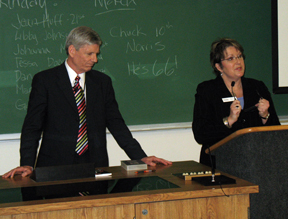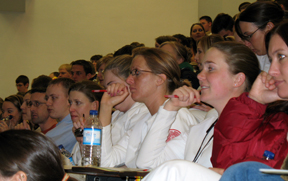 |
Alumni Affairs Director Kim Cuda introduces Stephen Smith, M.D., chief medical officer for The Nebraska Medical Center, who discussed medical errors and patient safety. |
And humans make mistakes.
Sorrel King was tragically reminded of that when her 18-month-old daughter Josie died of medical errors at a respected East Coast hospital.
On Wednesday, more than 350 first-year UNMC students packed the Wittson Hall Amphitheater to hear her advocate for safer hospitals and learn how The Nebraska Medical Center also is working to increase patient safety. The sixth annual Professionalism Seminar, hosted by the UNMC Alumni Associations, also was broadcast to the College of Nursing sites in Lincoln, Kearney and Scottsbluff.
“We have a responsibility to develop and maintain a culture of safety,” said Stephen Smith, M.D., chief medical officer for The Nebraska Medical Center. “There needs to be an open policy to make it OK to say something does not feel right. Each of us here has a responsibility to the patient.”
Medical errors kill as many as 98,000 Americans each year and harm countless others, according to a landmark report by the Institute of Medicine in 1999. Errors range from medication overdoses to X-rays read backwards. And in most cases, the injuries are not from a single mistake, but a cascade of failures in a system without sufficient safeguards.
“I wish I could tell you we were immune to that,” said Dr. Smith before sharing local examples of tragedies and close calls that highlight a changing culture in addressing medical errors.
The Nebraska Medical Center has incorporated various measures to reduce the occurrence of human errors, said Dr. Smith, referring to the “P.S. We Care” campaign, which began promoting a “culture of safety” in July 2001. “This culture expects employees to recognize that they have an impact on patient safety, no matter what their job,” he said.
The hospital is using the Patient Safety Network, which allows for instantaneous reporting, he said. The online system also allows a network of hospitals to review all errors, which helps identify trends in types of errors.
The hospital staff also engages in critical event analysis, asking why an error occurred and what can be done to prevent it from happening again. “There needs to be a break-down in the hierarchy of hospitals,” Dr. Smith said, noting everyone must be comfortable speaking out if something seems wrong.
 |
First-year students packed the Wittson Hall Amphitheater for the Professionalism Seminar, hosted by the UNMC Alumni Associations. |
Crew resource management also emphasizes the need for standardization through pre-surgical routines and the use of checklists, some elements already in use at The Nebraska Medical Center.
Through a video, King shared how her daughter Josie died in 2001 from medical errors — severe dehydration and misuse of narcotics — at Johns Hopkins Hospital. Although King was stunned that such errors could occur in one of the country’s top hospitals, she realized people make mistakes, and later said: “Human errors need a human solution.
“Josie’s death was not the fault of one doctor, or one nurse, or one misplaced decimal point,” she said. “It was the result of a total breakdown in the system. It was the result of a complete lack of communication between the different teams. It was the result of doctors and nurses not listening to a concerned parent. It was the result of a combination of many errors, all of which were avoidable.”
Health care professionals must communicate openly and admit they are fallible, she said in the video. They must listen to parents and trust their instincts and watch and listen to the patient: “Not all the answers are on your clipboards or computers,” she said.
At The Nebraska Medical Center, patient safety is the primary priority, Dr. Smith said, and responses to problems focus on improving system performance rather than on individual blame.
While unsafe acts are rare, Dr. Smith reminded students that there are limits to human performance. “There’s nothing wrong with saying sorry about the outcome,” he said, noting families often want to know what happened and what will be done to prevent it from happening again.
Kim Cuda, director of UNMC’s Alumni Affairs, said the interdisciplinary seminar helps increase the students’ awareness of professionalism issues and enables them to become even better health care professionals. “Our alumni often say they wish they had had the opportunity to interact more with students from all disciplines because a teamwork approach is how health care is best delivered,” she said.
Radiation therapy student Angela Richardson appreciated Dr. Smith’s candor in discussing some of the hospital’s past medical mistakes, saying: “We all have a responsibility for taking steps to ensure medical errors don’t happen again.”
Said first-year nursing student Michelle Gillen: “Hearing the stories really makes it hit home.”
Medical student Brian Butler, meanwhile, was glad to confront the topic. “It’s more important to work to fix it, than pretend there isn’t a problem,” he said.
King would agree.
Read a transcript of King’s speech to the Institute for Healthcare Improvement’s National Conference on Oct. 11, 2002 at www.josieking.org/speech.html.